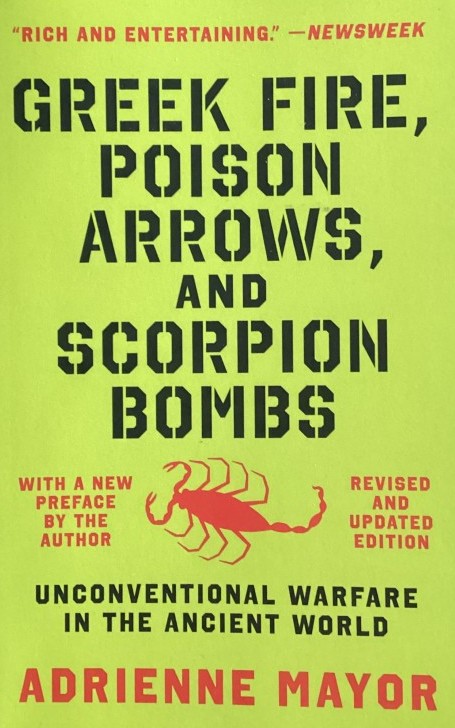Inspiring Older Readers
 posted on 29 Sep 2022
posted on 29 Sep 2022
Greek Fire, Poison Arrows, and Scorpion Bombs by Adrienne Mayor
I have often thought that, living here in the UK, I have been part of a lucky generation that has never directly experienced war on our soil - despite our country being party to countless conflicts abroad. As a consequence we’ve been spectators and commentators on the horrors of how war is conducted elsewhere and consumers of countless films, news broadcasts and television dramas in which carnage and mayhem are something we get in a voyeuristic and antiseptic way.
I’ve also grown up with the notion that war is governed in some way by a set of moral rules – that ‘noble’ wars are fought by people who engage in a ‘fair fight’ between legitimate (even willing) combatants who obey some guidelines that ensure ‘decency’. These rules include bans on the likes of chemical, germ and nuclear warfare, for example, which are seen in some way to be the weapons of fundamentally amoral or evil regimes.
Adrienne Mayor’s wonderful, newly revised book, Greek Fire, Poison Arrows and Scorpion Bombs in many ways draws back the curtain on the fact that what she calls ‘unconventional warfare’ has been an embedded part of human conflict since ancient times. What this book does in a riveting and hugely entertaining way is to show us that the poison gas of World War One, the use of Agent Orange and Napalm in Vietnam or the poison gas attacks in Syria and Iraq are all a continuation of tactics that have their origins in the Ancient World.
The use of these ‘unconventional weapons’ has, it seems, always been controversial and has offended the sense of the ‘noble warrior’ who wins through in a fair fight with no underhand tactics. But the public face of military rectitude always, it seems, gives way to the overwhelming need to win at almost any cost and this is ultimately what makes germ and chemical warfare irresistible to all armies. Mayor takes us back to the beginnings – finding the right poisons and the most effective way of delivering those poisons. Arrows and spears turn out to be the ideal delivery mechanism for poisons that will kill – some acting faster than others – striking fear and chaos amongst your enemy.
Poisoning water, spreading endemic diseases, using a crude form of napalm (Greek Fire) and even using deadly honey (who knew?!) are all documented here and Mayor’s great skill is to dig down deeply into the stories and uncover how these Ancient World weapons of mass destruction were actually developed and the impact they had.
Earlier editions of the book have had some criticism that she’s included stories from mythology as well as established scientific evidence to paint her picture but I have no problem with this at all. This new edition goes some way to addressing those criticisms by including updated scientific research that bolsters her story but the mythology is still there and is all the better for that in my opinion. Myths capture a truth beyond the material and scientifically provable and speak to cultural attitudes, religious beliefs and moral codes.
I really enjoyed Mayor’s other recent publication Flying Snakes & Griffin Claws: and Other Classical Myths, Historical Oddities, and Scientific Curiosities which is reviewed here and what made it super-readable was the fact that she was able to write with scientific authority but in an enjoyable accessibility that doesn’t need academic referencing or a language that makes it impenetrable.
You’ll come away from this book with loads of fantastic anecdotes and tons of new information but with a profound question still whizzing around in your head – can the use of these ‘unconventional’ weapons ever be justified and can they ever, ultimately, be effectively prohibited? The ability to find disgusting ways to kill people you consider your enemy seems to be the inspiration for remarkable ingenuity and that seems, sadly, unlikely to ever change.
The book is available from Princeton University Press and can be ordered from your local independent bookshop or ordered directly from the publisher’s own website.
Terry Potter
September 2022